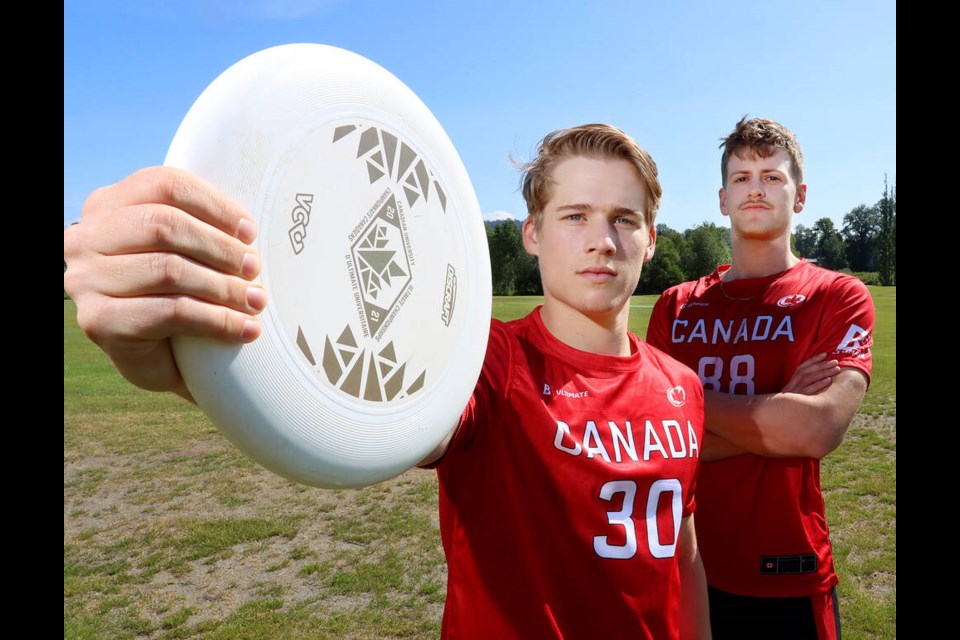There’s nothing like having something snatched away to motivate you to want it even more.
Port Coquitlam’s Ricky McLeod and Coquitlam’s Devon Bringeland were about to participate in a special training camp for Canada’s national Ultimate team heading to the U20 world championships in Malmo, Sweden, three years ago when the global COVID-19 pandemic yanked away their dream.
This year, they’re back as members of the U24 national side that will be one of 15 teams competing in the open division at the 2024 championships in Nottingham, England, July 2–8.
In between, McLeod and Bringeland had to soothe the sting of missing their chance to compete at the 2020 worlds and embarked on busy studies at the University of Victoria and the University of British Columbia, respectively, recommitted to their training and stepped up their game playing for Canada’s top men’s club: the Vancouver Furious George.
All with their eyes firmly fixed on the prize of being the best in the world.
Bringeland said getting robbed of the worlds in 2020 was “an emotional roller coaster” that took him a while to ride out.
“It was heartbreaking,” he said. “Making Team Canada was something I’d dreamed about.”
McLeod said the COVID-19 shutdown in the spring and early summer of 2020 put his Ultimate aspirations at a crossroads.
“You could quit, or you could work even harder.”
By late summer, as public health restrictions eased and sporting activities resumed, the fire to compete had reignited in McLeod and Bringeland.
“I was missing it,” McLeod said. “As soon as I got a taste of it, I was hungry for the future.”
Bringeland said the competitive progression from U19 to U24 is significant. Speed, intensity, athleticism, skill and strategy are all kicked up a notch.
“It’s a huge step up from juniors,” added McLeod.
In anticipation of their next opportunity to play for Canada, McLeod and Bringeland hit the gym to develop their strength, power and explosiveness.
They ran 10 X 400 m laps around the track for endurance.
They honed their fitness to prevent injury and to sharpen their competitive instincts, they tried out — and made — the Furious George side that has won 11 Canadian championships.
They also play for their respective university teams that are part of U.S.-based leagues.
Bringeland said at its top level, Ultimate is no longer about the good-time vibes and tie-dye shirts that come from the sport’s hippie roots, although games are still self-refereed that commands a high level of respect and communication between opposing players
“It’s a pure level of competition,” McLeod said. “But you don’t yell at people.”
Aside from the physical preparation to compete on the world stage, there’s also a playbook of set offensive and defensive strategies to learn — much like football — and money to be raised.
Canada’s national Ultimate program doesn’t receive government funding, so the athletes have to pay their own way to competitions — about $5,000 for the season. That means bunking down en masse at someone’s family home during training camps, carpooling to and from the fields and cooking communal meals.
It also obligates team members to launch personal GoFundMe campaigns and hit up corporate contacts for whatever support they can muster.
All while keeping up with their studies and part-time jobs.
“It’s a lot of late nights,” said Bringeland.
But the payoff will be worth the sacrifices, said McLeod.
“We take it very seriously,” he said. “Our goal is to dominate.”



